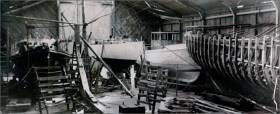Displaying items by tag: Pilot cutter
Tyrrell Pilot Cutter Brings Added Maritime Heritage
The long-lived boatbuilding name of Tyrrell of Arklow carries a resonance far beyond the shores of Ireland writes W M Nixon. In its impressive history, the dominant figure was Jack Tyrrell himself, whose own experiences of seafaring infused all the vessels he created, particularly those he also designed.
“Sea-kindly” would be a description which would spring readily to mind. But Jack Tyrrell well knew that merely creating a boat which was comfortable at sea was not enough – somehow he had to provide his customers with boats which were both sea kindly and yet efficient to run, with a good turn of speed when required.
Thus he acquired a formidable reputation for easily-driven hulls which could keep the sea in all weathers, and for a long period in the middle of the 20th century, Tyrrell of Arklow pilot cutters defined the type. And just as the sailing pilot cutters of former years proved themselves ideal for conversion to no-nonsense cruising yachts, so the fully-powered Tyrrell pilot boats gave themselves readily to conversion into seaworthy motor-cruisers of character when their working days were done.
This 45-footer is a classic example for sale on Afloat.ie boats for sale dept with Crosshaven Boatyard. And it speaks volumes for the Tyrrell reputation that she has spent all her life in Cork Harbour. In other words, she was built in 1971 to be the Cork Pilot, and as soon as word went out that she was to retire upwards of 20 years ago, she was snapped up by a discerning local enthusiast who set about turning her into the dream motorcruiser.
This is a vessel for the dedicated owner. Her price of €29,950 reflects this, as it’s effectively a deposit, while the ongoing payment system is to be found in giving more attention to the maintenance than would be required with a modern glassfibre vessel which would initially cost several mutliples more. Yet thanks to this special vessel, we are able to run this historic photo of the Tyrrell yard in Arklow at its busiest in the 1960s, and I’m virtually certain that’s the Robert Clark-designed Gipsy Moth III nearing completion at the centre of the photo. Six years later, this Cork pilot boat went forth from the same place – details here.
























































